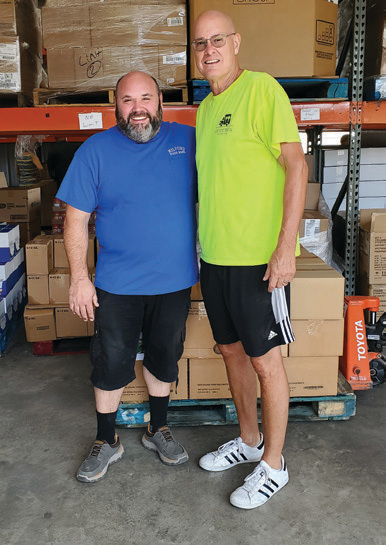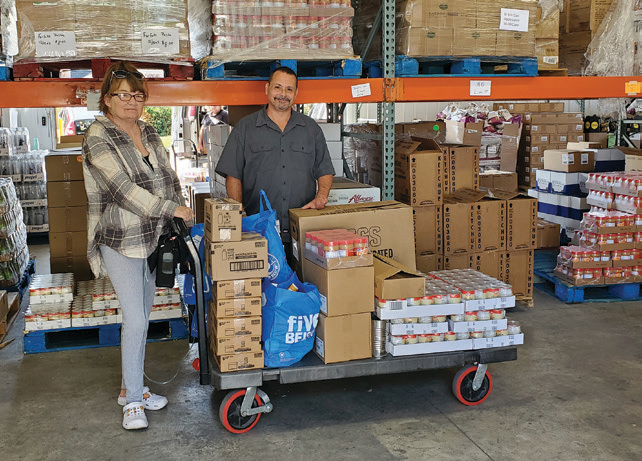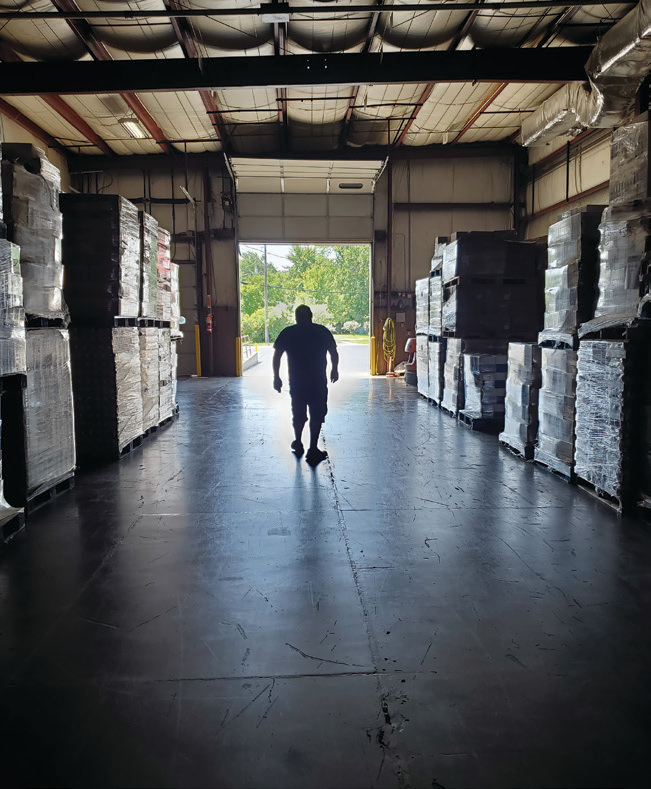
By Andrea Melton
On James Street in Milford sits an unassuming warehouse. The sign on the building reads “Milford Food Bank.” However, if you walk inside and engage in a conversation with Operations Manager Bill Doege, you will quickly find that it is more than a food bank. It is a passionately run organization where what some would call miracles occur on a regular basis. You might be surprised to learn that thousands of pounds of food move through this faith-based facility every month. It all started in 2010 with a borrowed trailer, a forklift, and a handful of volunteers.
Doege has been the operations manager of Milford Food Bank for two years now. His involvement started at the beginning when Bill Troup founded the food bank. Troup was friendly with the owner of The Papers. Doege was the warehouse manager for The Papers at that time. Troup received permission to store food in their warehouse and Doege eventually started helping Troup.
“I was going out and delivering food. It really opened my eyes to just how fortunate we are,” Doege described. “When we walk into somebody’s house and see no food in their house, we know how fortunate we are.”
According to Doege, the pantry steadily grew as he and numerous others volunteered alongside Troup inside the warehouse of The Papers. Eventually, they acquired the current warehouse on James Street.
“As of today, we have 135 partners. We cover 13 counties in Indiana and five counties in Michigan,” Doege said.
The Milford Food Bank partners go online to schedule their visits. There are 50 spots a week that can be filled. Doege said those spots do fill up quickly.
“Here real soon we’re going to have to give them more spots because our numbers are growing and of course, their numbers are growing. So, they need to come to get the food so they can bless their communities with it,” Doege said.
Incredibly, Doege is the sole paid employee at Milford Food Bank. There are around 25 regular volunteers who help run the food bank. Doege said several of the core volunteers have been there from the beginning.
Milford Food Bank is fortunate that groups such as the Lions Club, Kiwanis Club, Boy Scouts, athletic teams, and others who are looking to do service work also contribute volunteer labor throughout the year. Doege said it helps when new faces come in and see what is being done and then go tell people about it.
“That’s how we’ve grown, is through word of mouth. We’re not too keen on advertising. We’re not marketing people. We’re just here to do God’s work and be hands and feet,” said Doege.
According to Doege, most of Milford Food Bank’s funding comes from private, local individual donations, churches, and a few businesses. The partners who come in also support the organization by leaving donations.
YOU HAVE TO HAVE A PHONE
So, how does one employee and a volunteer staff orchestrate such a huge food distribution project?
“Well, first and foremost you’ve got to have a phone,” laughed Doege. “You got to have that phone on you, and you have to have it on you pretty much all day and into the evening. It doesn’t stop. When somebody needs to get rid of food, they want it gone as soon as possible.
“The latest I went and picked up food was 10 o’clock at night. And that was because a semi got refused over in Garrett at a Walmart, and it was all fresh stuff,” remembered Doege. “And they sent it over to one of our partners and they don’t have refrigeration! So here they’re getting a whole semi-load of fresh stuff and they have no refrigeration.”
Doege and crew went in a refrigerated box truck that night, retrieved two loads of fresh food, and brought it back for prompt distribution. It’s about relationships, and connecting the dots, said Doege.
“You have to have these relationships with organizations and companies. And when you stockpile a portfolio of these relationships, then you can keep this building full,” he said.
Doege said Milford Food Bank has two box trucks of their own that are on the road most days going somewhere to pick up food. There are three volunteer drivers and Doege. Sometimes a late evening is required. Often, significant moments impact Doege and remind him of why he is there.
“I was unloading a truck late at night,” Doege said. “We got done unloading. The truck driver said, ‘Bill, there’s a lady who pulled up that needs you.’ She had a young boy with her. I asked her what she needed. She said she just wanted to know when the next giveaway was.”
Doege said he told the woman the next giveaway would be the following Wednesday and asked her again what she needed. She ended up talking with him for a very long time about what was going on in her life and the circumstances that brought her there.
“Eventually I asked, ‘Can you please tell me at least one thing you need so I can see if we can provide it?’” Doege recalled. “And she said, ‘Where I live, in my apartment complex, our water’s no good and I need water for my son.’”

Doege remembered his immediate goosebumps. “And I told the woman, ‘Do you realize that I just unloaded a semi-load of nursery water right before you got here?’”
HOME FOR THE FUTURE
Across the street from Milford Food Bank there is a piece of property that is going to be donated to the organization as a site on which to build their future warehouse. Doege said they recently started drawing up plans and going through the process to determine how much it’s going to cost to build the new structure.
“That will get us out of The Papers. Right now, we’re still using their space to store our food,” he said. “Ron graciously gives that to us for free. It would be nice to have it across the street because it would be easier for everybody. Right now, we’re having to transport stuff from block to block, and it just takes a lot of time.”
Doege said most of the funds received from the Operation Round Up grant will be used for food. He said the grant money is a tremendous help.
“We have to make that decision in a matter of minutes on the phone. So, that’s why we need funds in our account all the time,” he said. “When those phone calls come in, if the funds aren’t in the account, I have to say ‘no’ to it. Even though it’s a great deal and it will help a lot of people. If the funds aren’t there, we can’t say ‘yes’ to it.”
According to Doege, sometimes they must pass on food and that’s difficult for him to stomach, because they could have helped more people.
Visit milfoodfoodbank.org to donate.
ANDREA MELTON is the marketing and communication specialist at Kosciusko REMC.




